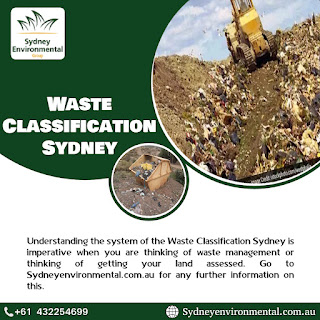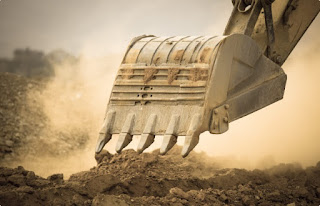 |
| Waste Classification Sydney |
Understanding the system of the Waste Classification Sydney is imperative when you are thinking of waste management or thinking of getting your land assessed.
Sydney Environmental Group takes a pioneering approach to contaminated and potentially contaminated land projects. We have client-focused strategies for residential development sites, large scale infrastructure projects as well as complex commercial or industrial sites with comprehensive contamination issues.
 |
| Waste Classification Sydney |
Understanding the system of the Waste Classification Sydney is imperative when you are thinking of waste management or thinking of getting your land assessed.
Waste Classification Report Sydney
Waste classification report Sydney also helps you know more about the guidelines for waste classification. The waste classification report Sydney is the report that suggests more about different types of wastes that are contaminating the environment.
Proposed sites for property development
can have contamination. Without doing proper research and tests to know the
contamination, this is not possible to trace the contamination so easily. When
you are looking forward to start the construction work at that site, first you
need to determine whether or not that site is being contaminated. For this you
have to take help of the professionals for sure. They have the right
equipments, methods, techniques, ideas and skills to trace any kind of
contamination that can be there at the site. For this they follow step by step
process. They first opt for the phase one investigation which is also known as
the preliminary site investigation NSW.
During this phase, they try to figure out whether or not that site is being
contaminated. For this they follow a step by step approach such as inspecting
the site thoroughly, investigating the ground water level, air and soil to find
the possible contamination, doing the tests and researches for the same.
·
This phase is vital
Once the contamination is traced,
during the phase two investigation, such a service provider will try to figure
out what sort of contamination it is. This is very important! Why? As on the
basis of the type of the contamination, the remedial action plan NSW will be prepared. Until and unless the
type of the contamination is not known, this plan cannot be formed.
 |
| Remedial Action Plan NSW |
·
Proper remedial plan must be formed
For different types of contaminations,
the remedial plan can differ. Safely disposal of the contaminating elements is
always essential. This is how the human health and environment can remain safe
further from a possible contamination.
As
far as the waste materials are concerned, they can be found in different forms
these days. On the basis of their types and forms, wastes are also classified
into different categories. Non hazardous, hazardous, solid waste, liquid waste,
semi solid waste, and asbestos carrying wastes are a few to name. The
deposition of the waste can also trigger contamination like issues. Waste can
merge into the environment of that area and can create contamination that is
tough to deal with. If you are in Sydney and want to go for property
development at a site, then first you need to determine the possible waste
which is present there. For this you have to generate the waste classification report Sydney first. And this is where you
must take help of the professional waste classification service provider. Such
a service provider will inspect the site to trace the type of waste present there
and can give the report that tells more about what sort of waste is found and
what steps can be taken to eliminate it safely.
 |
| Waste Classification Sydney |
·
It must be disposed safely
Safe
disposal of the waste must remain as the prime concern here. Waste can be
easily found these days at different property development sites. Until and
unless that waste is removed from the site, you cannot just start the
construction work there. This is where the waste classification Sydney can bring a great help for you.
·
Classifying the wastes
In
order to classify the type of waste, the service provider is going to consider
a few factors. Waste can be classified on the basis of the source of their
release, how hazardous they can be and physical characteristics.
State and Federal
regulations order the legitimate removal of synthetic, electronic, general, and
unsafe waste. It isn't OK to toss things into the dumpster except if the
proprietor is sure that the things don't groups qualities that would
characterize it as unsafe.
The Environmental Protection
Agency (EPA) realizes that the removal cost for perilous waste is high,
subsequently, they characterize things like PCs and bright light bulbs that
contain these metals as similar to widespread waste and you must know the
importance of Remedial Action Plan NSW.
 |
| Detailed Site Investigation NSW |
This implies these things
can oversee by reuse. Different synthetic substances should be discarded as
risky waste. It's the business's obligation to decide the grouping of the waste
and how the material is to be discarded. They should be exceptionally mindful
so as to do so accurately to keep away from serious and exorbitant punishments
and damage to the environment.
Another significant
obligation that businesses have is on keeping consistent with state and
government guidelines worried above and subterranean petrol gas tanks. There
are numerous regulations directing that substances report and register existing
tanks at their office. There are every day, week after week, month to month,
and yearly record keeping and revealing that goes into being an oil tank
proprietor for Detailed Site Investigation NSW.
Coordinated Pest Management
or IPM is the most un-harmful way to deal with bother management. IPM is
significant in light of the fact that nobody needs to work with or around
harmful or hazardous pesticides, herbicides, or some other compound that is
intended to "kill". Also, we absolutely don't have any desire to hurt
the environment all things considered.
Waste classification report Sydney also helps you know more about the guidelines for waste classification. The waste classification report Sydney is the report that suggests more about different types of wastes that are contaminating the environment.
 |
| Waste Classification Report Sydney |
Environmental change is in the frenzy, crushing numerous nations with various peculiarities, for example, fierce storms of remarkable strength and rising ocean levels that take steps to eat up modestly raised nations. Whenever left unattended, environmental change might develop to an eradication level occasion.
To pay all due respects to
the call to make a move, the United Nations, as the greatest association of
free nations had sent off its mission for the shift to reasonable energy
likewise once in a while called spotless or environmentally friendly power
energy with proper Waste Classification Sydney.
 |
| Waste Classification Report Sydney |
Practical energy is the demonstration of giving energy that adequately fulfils the needs of today without forfeiting the capacity of the following ages to address their issues come their time. All sustainable power sources, for example, for example, plant matter, sun-oriented power, wind power, wave power, geothermal power, and flowing power as a rule fall in this classification.
Practical energy sources may
likewise incorporate innovations that make energy age more productive. Regular
parting, as well as different kinds of atomic power, can likewise be delegated
maintainable. Such grouping notwithstanding is extremely disputable due to the
various perils atomic power brings along, for example, top uranium, radioactive
waste removal, and the risks of calamity because of mishap, illegal
intimidation, or cataclysmic event.
The United Nations is the worldwide pioneer for the progression of manageable energy and has begun making and fostering locales for improving current strategies as well as growing new techniques for producing efficient power energy with the help of WasteClassification Report Sydney. The UN has as of late named 13 additional global locales committed to the turn of events and testing of elective ways to deal with environmentally delicate financial development, bringing the all-out number of such destinations to 534.